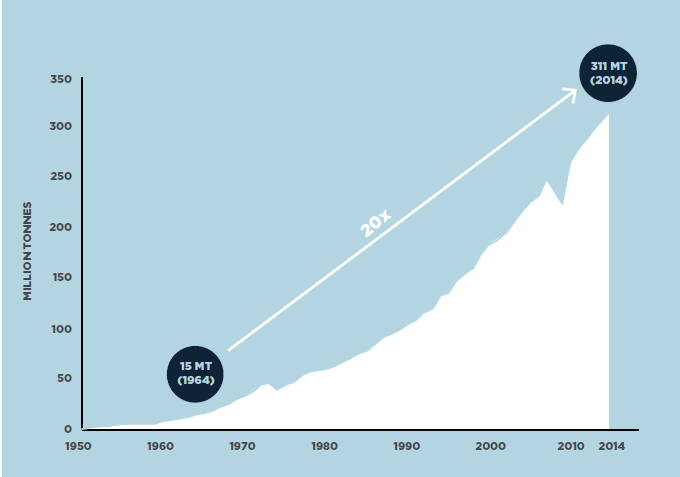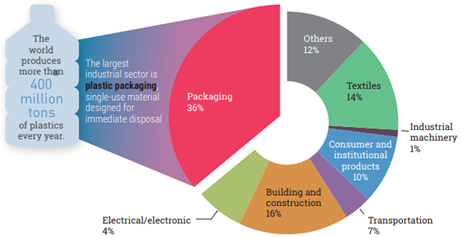Plastic production has exploded since the 1950s. Its successful role in many applications during World War II helped to spark tremendous growth in the ensuing peacetime economy. According to the Ellen MacArthur Foundation, global plastics production surged by 20 times over the fifty-year period from 1964 to 2014 (See Figure 1). It is anticipated to double again by 2034 and almost quadruple by mid-century.
Figure 1: Growth in Global Plastics Production 1950 – 2014

The widespread use of plastic has created an immense and intractable pollution problem. With very low recycling rates, plastic waste doubled globally over the past 20 years. Plastic waste totaled 44 million tons in 2019 in the U.S. alone, equivalent to 295 pounds per person.
Much of this waste in the U.S. and globally comes from single-use plastic items. An untold number of plastic forks, bottles, and bags are used only once before they are discarded. A typical plastic bag is used for only 25 minutes but then can take up to 1,000 years to decompose. As shown in Figure 2, the world produces 400 million tons of plastic every year. Of this amount, 36% is in the form of plastic packaging, including carry out bags, designed for immediate disposal.
Figure 2: Global Plastic Production by Industrial Sector, 2015
Source: Single-Use Plastics, A Roadmap for Sustainability. United Nations Environment Programme, 2018
To reduce the amount of plastic entering the environment, Green Needham developed a proposed plastic bag ban bylaw after consulting with town officials on the wording. The bylaw will be introduced as a Citizens’ Petition Warrant Article that will be voted on at the May 2023 Town Meeting. If approved by the majority of Town Meeting Members, the bylaw will end the use of single-use plastic checkout bags that are being distributed by retailers and mostly discarded. Green Needham is also encouraging shoppers to use reusable bags as a sustainable alternative, as both paper and plastic bags can negatively impact the environment.
If you would like to get involved, please consider joining the Plastic Waste Reduction Team. Please visit our website for more information.
References
Greenpeace. (2022, October). Circular Claims Fall Flat Again, 2022
United Nations Environment Programme. (2018). Single-Use Plastics, A Roadmap for Sustainability



Hi John,
Five years ago, when you opposed the original ban, you said 90% of the single-use plastic bags were from the big stores. If it’s now 99.99%, that means a lot of small businesses have figured out how to get rid of plastic bags . So a full ban is simpler and fairer, with virtually no negative impact on business.
Single-use plastic bags are a problem They are ending up in the environment (litter) and in the recycling at the RTS where they contaminate the load. Even those that are incinerated leave toxic residue (in the fly ash). And you know from your time on the Select Board that Massachusetts is running out of options for trash. Incinerators (however well maintained) will reach end-of-life and then all that trash will be trucked out of state to landfills elsewhere. Kicking the bag down the road is not the answer.
Newspaper bags, unlike checkout bags, don’t have a ready alternative. A newspaper bag weighs 2 grams. The heavy plastic supermarket checkout bag weighs 40 grams. You can have a newspaper delivered for two months before you equal the impact of one small shopping trip (3 bags).
Yes, there are other sources of single-use plastic. That we can’t address them all at one is no reason not to tackle the ones we have a solution for. The plastic checkout bag is a much bigger problem with a ready solution.
I agree with a ban on the large stores which generate 99.99% of the plastic bags. The small retailers account for close to zero.
Plastic bags used in needham are incinerated so the statistics on decomposition are not accurate for needham.
More plastic bags are used on newspapers delivered daily in Town.
This is a solution in need of a problem that doesn’t exist in Needham.